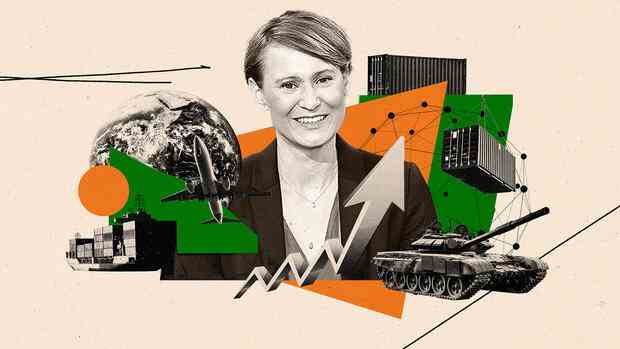“Beauty is in the eye of the beholder,” said the Greek historian Thucydides. The situation is similar with the balance of the German reaction to the “turning point”, almost ten months after the start of the Russian war of aggression against Ukraine. The further one moves away from Berlin in the direction of Warsaw, Prague, Vilnius or Riga, the more the self-perception and the perception of others diverge.
In Berlin, representatives of the traffic light coalition like to tell a success story at the end of the year that goes something like this: After less than three months in office, the new government was brutally surprised by the outbreak of war. Almost overnight, she initiated a revolution in German Russia, security and energy policy. She made decisions that were previously unthinkable.
Today Germany is one of the strongest supporters of Ukraine – financially, humanitarian and also militarily. The traffic light has also created a special fund worth 100 billion euros, with the help of which the Bundeswehr is to be transformed into one of the most powerful armies in Europe.
In addition, there is the energy transition, which is being pushed ahead at full speed, away from fossil fuels from Russia. If you put all of that together, you “got quite a lot done” in the first year of the coalition, as Olaf Scholz recently summed it up.
Top jobs of the day
Find the best jobs now and
be notified by email.
On the other hand, those who are traveling in Central and Eastern Europe these days hear fewer positive things. After the announcements from Scholz’s speech at the turn of the century were initially greeted with euphoria, there are increasing doubts about the seriousness of the German change of heart.
February 24th did not herald a “turning point” for Poland and the Baltics, but Moscow started the war back in 2014 – the Germans just consistently misjudged Putin’s intentions. To this day, the region has the impression that Berlin still hasn’t understood what really makes Moscow tick – and what’s at stake for the region.
The view that is currently widespread in the Chancellery that the danger of a further escalation of the war in Ukraine is increasing in view of Russia’s military failures is seen exactly the other way around in Riga and Warsaw. They believe that Russia must be crushed in Ukraine, otherwise the Baltic States or Poland will be Putin’s next targets.
To this day, the impression prevails in Central and Eastern Europe that Berlin still hasn’t understood how Moscow really “ticks” – and what is at stake for the region.
(Photo: Reuters)
The fact that Berlin is acting with the handbrake on when it comes to arms deliveries to Ukraine, for example by not delivering armored personnel carriers or battle tanks, is seen as a lack of support, not only by Kyiv. Scholz’s repeated phone calls with Putin and the fact that the chancellor holds out the prospect of resuming economic cooperation, even if it is in the distant future, contributes to the assessment that at least the chancellery still hasn’t heard the shot.
The decision-makers in the capitals of NATO’s eastern flank also perceive with great incomprehension that Germany can build an LNG terminal at record speed, but is allowing a lot of time to go into the country for the procurement projects for the Bundeswehr before orders are awarded to the industry . The fact that the two percent target was missed this year and next is shaking heads at a loss, especially in Warsaw, where the modernization of its own armed forces is in full swing.
Disappointment with Germany is also widespread in the Polish opposition
If Germany really wants to become “a guarantor of European security” (Olaf Scholz) or a leading European power “also in the military” (Christine Lambrecht), Berlin must acknowledge that it is viewed with suspicion in Central and Eastern Europe and focus more on this region make an effort. Above all, the federal government needs to explain its policies better.
>> Read here: Gas dispute, revolts and greasy sweets – The four phases of Russia’s long economic war against Ukraine
In Berlin, however, it is sometimes pretended that the criticism is primarily the result of the unscrupulous propaganda of the Polish governing party Law and Justice, which has been cultivating the systematic badmouthing of Germany for years. In fact, the “PiS” never misses an opportunity to position itself against Berlin in a media-effective manner, also in order to increase its chances in the current Polish election campaign.
But disappointment with Germany is also widespread in the Polish opposition. The mistakes in Germany’s Russia policy over the past 25 years, which both the incumbent chancellor and his predecessor like to casually ignore, are still omnipresent there, as they are in Riga, Tallinn and Vilnius. An honest review would be an important step to give the German turning point more credibility.
More: Anger at “Germany first” – How the Chancellor isolates Germany in Europe
